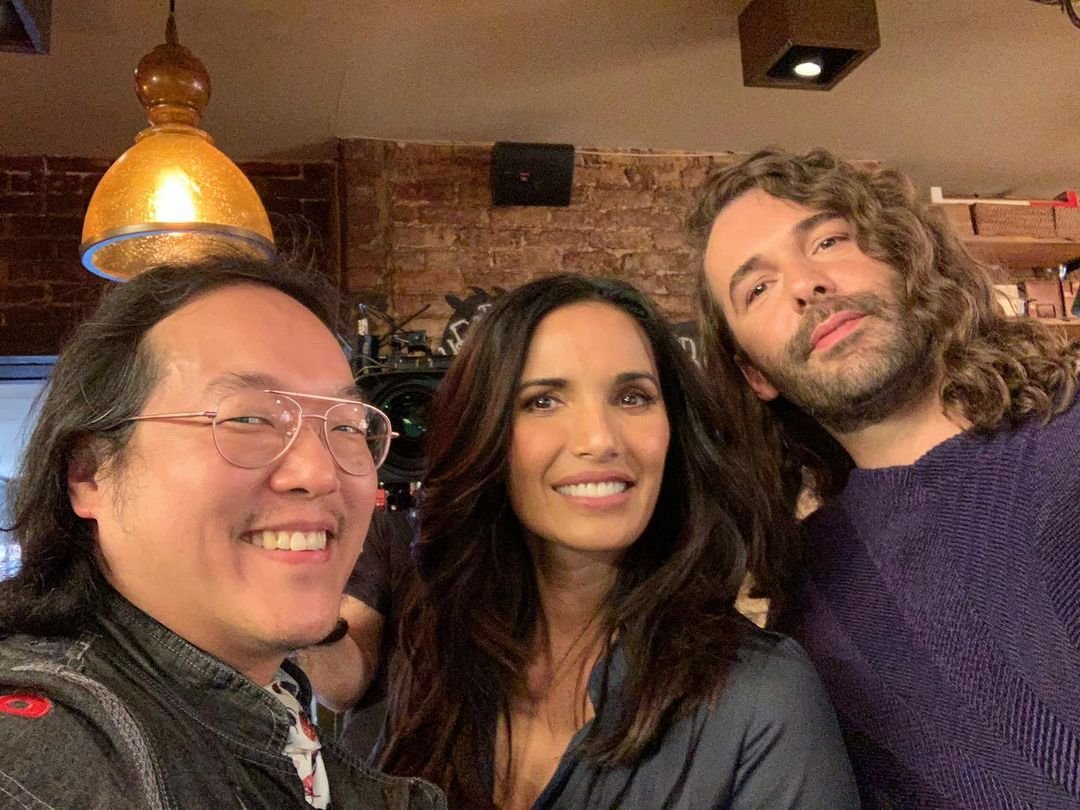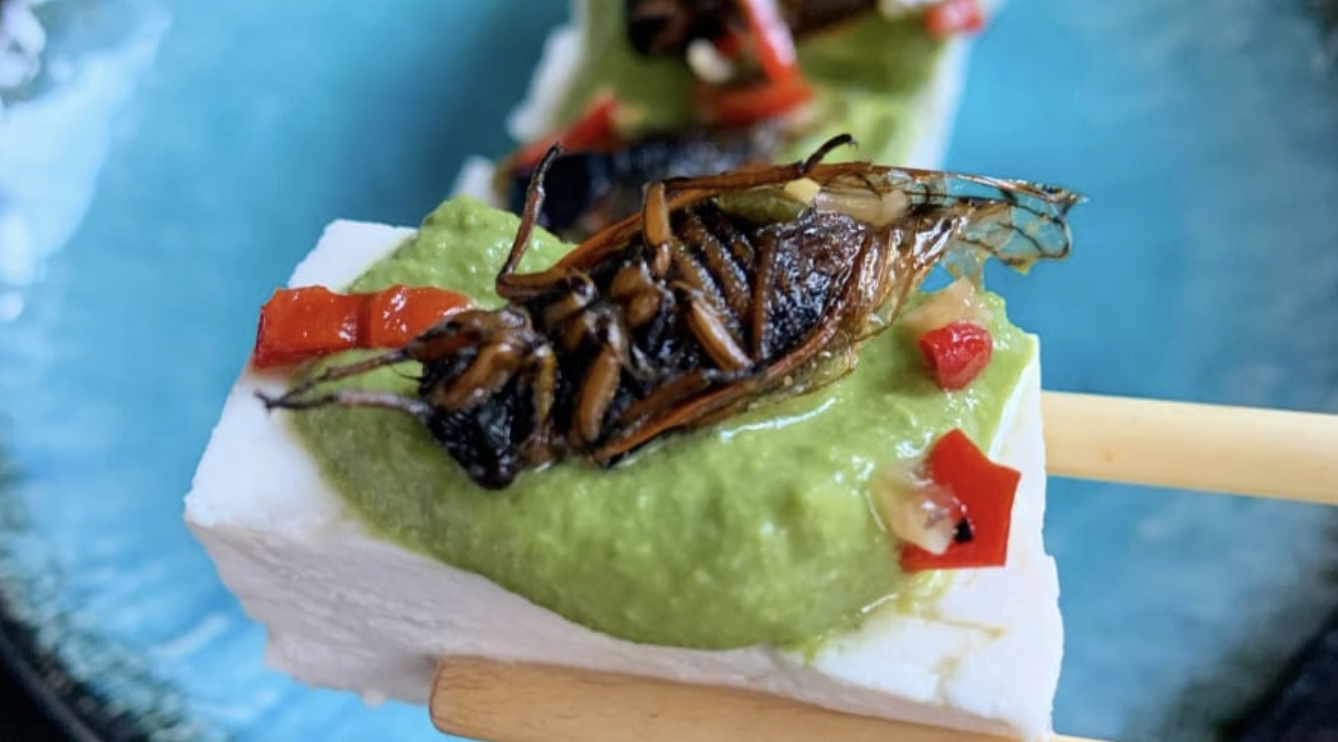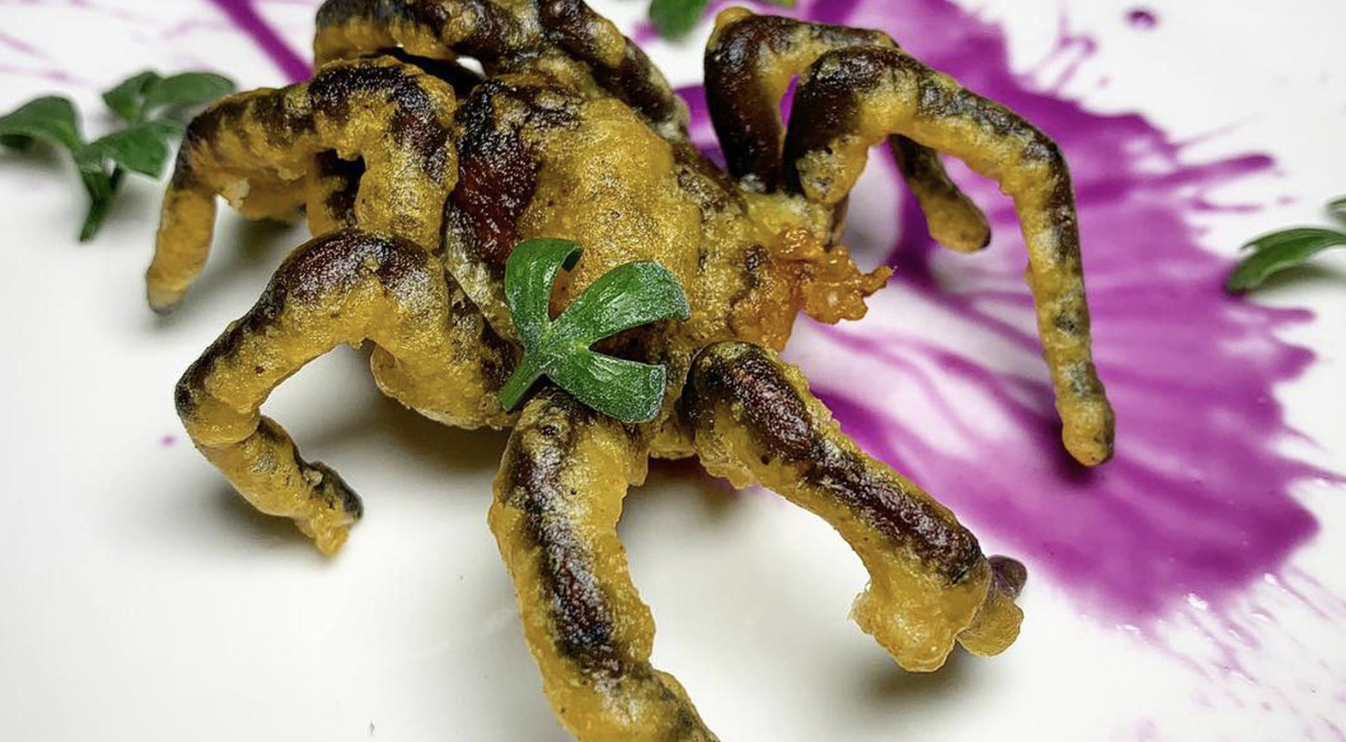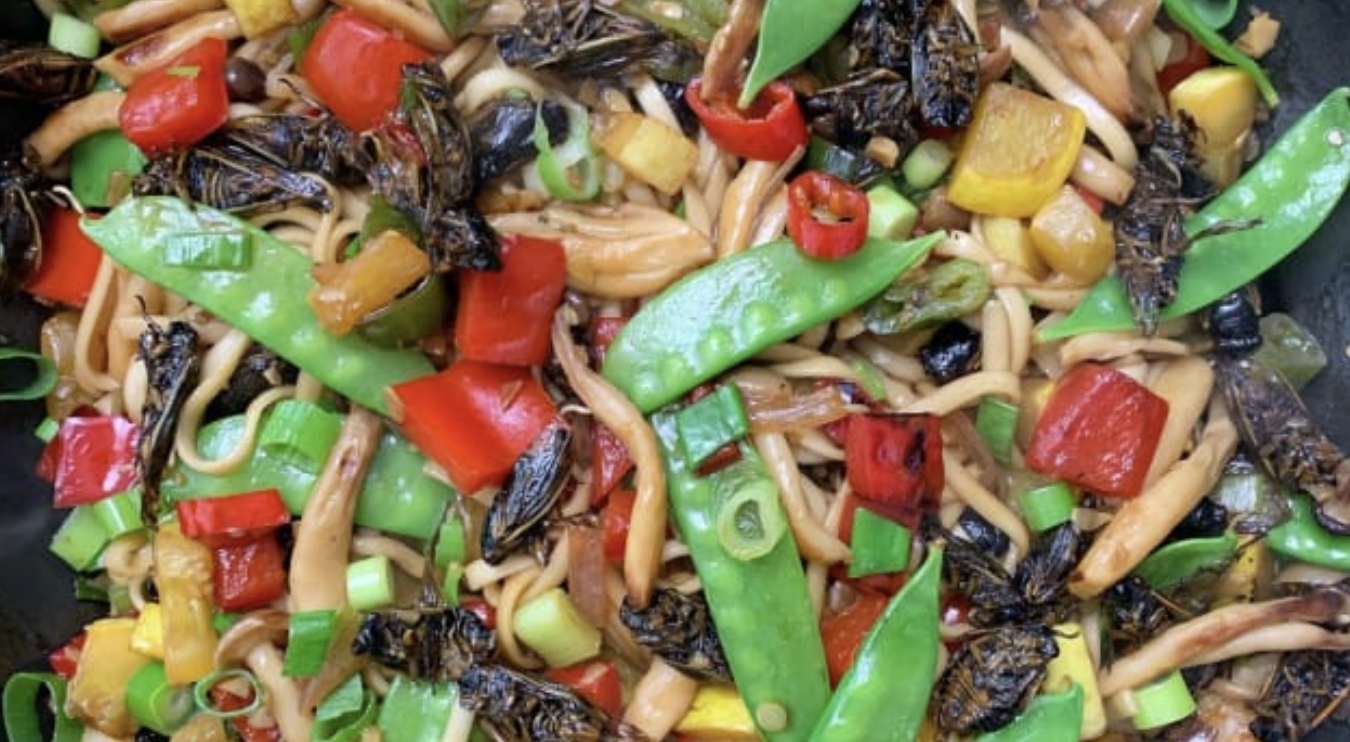Get to Know Edible Insect Expert, Joseph Yoon from ‘Getting Curious with Jonathan Van Ness’
Jonathan Van Ness‘ first executive-produced Netflix solo series, Getting Curious with Jonathan Van Ness made a splash worldwide, with viewers left in awe after learning about the multitude of subjects Van Ness explores with the help of some key experts. We wanted to go deeper and speak to some of these experts you’ve seen on the show and get to know a bit more about them and their respective crafts.
We caught up with Chef Joseph Yoon, the founder of Brooklyn Bugs whose mission is to raise awareness and appreciation for edible insects through delicious, creative, and educational programming. You’ve seen him on Episode 1, Are Bugs Gorgeous or Gross? so we sat down with him and discussed just exactly how he became an expert in the field of edible insects, what insects mean to humanity, what his experience was like on the show, and what’s to come for the future!
So tell us, how did you become an expert in edible insects?
I started cooking with insects about 5 years ago and prior to that, I had been cooking as a private chef and caterer. One of the beautiful connections that I love making as a chef is that we try to think of ways to provide nutrition and something delicious and healthy, but when you think about the personal connection, say a wedding or party with your family where everyone is congregating around the kitchen, you can really define these emotional connections that families, get-togethers and parties have. So I took great honor in being able to join people and be the chef at their weddings, at their anniversaries, and just being able to connect with them beyond being a chef. So when I started working with edible insects and realized that, “okay this will bring a really extreme reaction for most people and that reaction will be one of visceral disgust most of the time.”
So how do I take this idea that really resonates with me… this idea that edible insects are widely eaten around the world by over two billion people in 80% of the world’s nations? How do we take this nutrient-dense and sustainable food source that the UN’s Food and Agriculture Organization (FAO) endorsed in their 2013 report and make it so that we can redefine and reimagine what this food can be? What an incredible challenge to take on, and so when I started with edible insects 5 years ago, it was an incredibly meaningful project. What started as a project for me in trying to see, “okay can we successfully get people to consider eating insects?” Pretty early on I found that, yes, we could be successful because, within half a year of cooking with insects, I got a call from the New York Times and from NPR and Gizmodo and all these journalists who were never interested in what I was cooking before, all of a sudden interested. So with me having this great interest and being inspired and motivated by this idea of sustainability and environmentalism… to get this kind of interest from all these incredible media outlets that I love that made me feel like, wow, there is something here that I want to explore deeper. And so to go from being a chef then to start getting some interest from science journals in the media and to think, “okay I could potentially change or be a part of the catalyst that changes a generational mindset globally around edible insects…” So I just fell in the wormhole and just completely began devoting my entire life to trying to figure out and solve how we can get and normalize edible insects.
What about insects made you go, “wow, this is something people need to be consuming”?
Well, I first started by working on an art project with Miru Kim. She approached me and asked if I’d be interested in working on an art project with her called Phobia/Phagia. I said yes without knowing very much about eating insects. I had tried some before; some scorpions and agave worms. I went online and I did a little research and immediately I see the UN report and learned that there is a greater purpose…that there’s this idea that eating insects can provide a solution for feeding the world’s burgeoning population and that there’s a lot of science behind it. That really connected and gave me a great sense of direction and purpose.
Once I started serving insects, I began realizing that we can literally be a part of transforming people’s minds and a global mindset. And when I would serve edible insects, I would see people literally freak out! People would come up to me and get angry with me. For some reason what I was eating and wanting to share would create extreme reactions. And so being able to respond by killing them with kindness and say “I understand how you could feel so upset by this and if you’re willing to listen I’d be happy to share why I’m doing what I’m doing,” and it completely disarmed them and then they’re like “okay maybe I can try it if I don’t have to see it” and they try one of the bites and progress through this tasting menu—I regularly 8 to 10 dishes at all these events. So they will eat cricket gruyere, taste it and be like, “okay give me something else.” And they’ll progress through the tasting menu and then get to a scorpion or a wasp or tarantula and literally be like “I am terrified and have arachnophobia.” To offer them this opportunity to eat that fear and with the guidance, for them to know to understand “okay this is like nutrient-dense and sustainable, a chef is preparing it, I’ve seen him with JVN on Netflix…okay I’ll try it.” So to be a part of helping them conquer their fear and watch them eat that scorpion or spider and feel so transformed and empowered by that is such an incredible relationship to have with diners. Those types of experiences immediately resonate so profoundly for me and it’s something that I have such great gratitude to be able to have these experiences with my diners.
What are some misconceptions you want to clear up about insects and consuming them?
Some misconceptions that are very common are that bugs bite you, they are pests, and they are just commonly thought of as disgusting things that you don’t want near you. So I want to completely change and be able to give people a new way to think about insects. Getting people to appreciate and understand that eating insects means that they are farmed or foraged specifically for human consumption–the ones that I use happen to be also processed at FDA-approved facilities—and most importantly, they are delicious. If they didn’t taste good, it would not make any sense at all whatsoever to try to even try eating them. I’m coming up with this new idea because the term “bug” is thought of as a pejorative. I want to flip that word around and when I say “I bug you” that means “I love you.” Just starting to integrate these ideas culturally and to really start not just redefining the idea of what eating insects is, but down to the very core of how we’re even going to refer to bugs, where I hope that by the end of the year people all over the world are going to say “I bug you.” These simple ideas can really help to transform and change the entire narrative and perception and that’s really what we’re trying to do in trying to clear up some of these misconceptions around insects.
How would you describe your time on the show and cooking for Jonathan and Padma Lakshmi and unearthing their curiosities?
So we recorded February 2020 before the vaccine came out, which means that we had such intense rules of how we engaged with people and who could be near us. Prior to filming Getting Curious, I had only seen my immediate family after quarantine and maybe a couple of my best friends. I was in either quarantine or social isolation so the idea of seeing JVN after not socializing with anyone gave me a little bit of the butterflies—and I usually do not feel that way ever at all. When I first heard from JVN’s camp, I was like “oh my God. I would love to do something with JVN” and then they were like, “we are going to have a special VIP guest,” and I was like “okay cool.” I didn’t ask who it was because I do a fair amount of media appearances, and I didn’t want to bother them about who the guest would be. So I tried to play it cool, and then we waited and a week before filming, they confirmed the guest. They said, “we got Padma Lakshmi.” I was like “Oh. My. God.”
She is literally the top 3 women alive that I’d want to cook for and share my food with. So what an incredible opportunity and how incredibly meaningful for both WOW and for Netflix and JVN to be like “we’re going to do this and we also want to include the idea of eating insects and we want you to be the guy to do this.” What an honor really. So I finally got on set and was exhausted because I didn’t really sleep very much. We made a massive amount of food, and usually, I actually would have a sous chef or someone helping me clean up, but because of COVID I had to do it myself and so I was already exhausted, but I had no excuse whatsoever and knew I was trying my best. I was so happy and just ready to go. It was really truly among the most memorable experiences I’ve ever had in my life and at one point JVN said, “Joseph, you are the edible insect ambassador for the world!” and Padma was not a Top Chef judge; she wasn’t like “Joseph, pack your knives and go,” but she was part of the dialogue with me celebrating this moment. Spending that time with them is really something I will cherish forever.
What is the #1 thing you wish people knew about insects?
That without them, we would not survive. The planet will not survive without insects. They are so fundamental to our very existence, so for us to poo poo them the way that we do and squash them because they are thought of as disgusting creatures…what a mistake! When we humans, by nature, are able to commodify something, we place greater value on them such as bees or silkworms. Everybody’s like “save the bees!” or “silkworms make silk!” and so they are seen as more valuable, so to be able to transform the idea of insects to edible insects and increase their value…it works towards the overall importance of insects and conservation as we just place greater value on their role and how just absolutely important they are for our very existence. I always say just that they are vital, and that we would not survive without insects.
What are your tips to those who also want to become edible insect experts?
Becoming an expert is one thing and becoming someone who eats insects is another thing, but I think one of the best ways to work with edible insects is to think about your all-time best dish and say “okay why don’t we take your best dish and how can we incorporate edible insects into it?” For example, if you make an eggplant tofu dish, you can make a chili sauce with some kind of powder that will add flavor and thicken the paste up with insects, or maybe if you like crunch then we can also add whole crickets and add aromatics when you add the onions and ginger and garlic. Or you could also add another component with the cricket where you have two layers, one with the sauce and one as a crunchy topping. Think about what you love making and how you can introduce insects into that dish instead of thinking “this is a new ingredient, so I need a new recipe.” Why complicate things? So that’s how I’ve made the hundreds of dishes I share. There are a lot of resources online, there are tons of videos and cookbooks that have edible insects. I think the biggest thing is just to keep an open mind!
Are there any exciting future projects coming up?
I am the culinary director for the Future of Food at SXSW and there are over a hundred speakers. It’s the only food programming that’s at SXSW. So what I love is the attempt to discuss the future of food. We need to come up with a consensus and define what the actual meaning of food is in terms of social justice, food security, inclusivity, and culture. We need to bring more humanity to the idea of food before we can even attempt to talk about the future of food. I love being in a position to be able to help create the narrative around these conversations and so I’m super excited about it.
I’m also going to be participating at the Central Texas Allied Health Health Institute, as well as participating as the culinary director for an Insects to Feed the World Conference, a biannual conference that came out of the UN’s FAO Report, which brings together scientists and academics and chefs just so that we can all talk about eating insects. I’m super excited that I’ve been speaking with the New York City Department of Education for their STEM program to discuss creating a curriculum for the New York City STEM program around entomophagy and edible insects. I’m also speaking with the 4-H Extensions Program about at-home programming around entomophagy. We have a huge activations at the ESA (Entomophagy Society of America) Conference. There just continues to be a great deal of interest in this idea and what’s really most exciting and so incredible is that the world has collectively never spoken more about eating insects than at this very present moment and we are in the middle of that conversation. What’s been really most fascinating and among our greatest victories so far is that the New York Times Opinion just put out a video making the argument for us. PBS Nova, one of my all-time favorite science programs, did an entire hour-long episode on eating insects making the compelling argument for us, Asian American Life on PBS made the argument for me, and so when we have a voice and more people starting to make that argument for us…that is just a great resounding sign that we are hyper-accelerated more than anyone possibly imagined 5 years ago.
Lastly, The National Science Foundation awarded a 2.2 million-dollar grant to this new foundation, the IUCRC which funds universities to conduct research. And so this new foundation called The Center for Environmental Sustainability Through Insect Farming, was founded and in order for you to be a member you pay $50,000 and that goes towards the research that the board that all the members vote on. I feel so incredibly blessed and validated that this organization had a special vote. I spoke with the director and she was like, “Joseph we’re going to have a special vote because you should obviously be a member.” And so they had a special vote for me to become a member and it was just approved, so I just feel so grateful that these organizations and scientists place such great value in what I do to even have a vote that’s not during their regular meetings. I really believe that we are going to see this more and more and it’s all just makes me so happy to be a part of this and to share these values and ideas of love and inclusivity and understanding. This is very much why I was so attracted to Jonathan’s work as well. What a joy and a blessing! I’m just very grateful and happy that I can share a lot of these ideas and the joy, the unbridled enthusiasm and hope, and optimism that I have in doing this work.
Be sure to follow Brooklyn Bugs to stay updated on Yoon’s edible insect journey, and stream Getting Curious with Jonathan Van Ness on Netflix worldwide!



